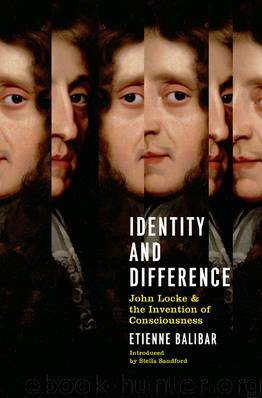Identity and Difference by Etienne Balibar

Author:Etienne Balibar
Language: eng
Format: epub
Publisher: Verso Books
Published: 2013-10-07T16:00:00+00:00
CHAPTER TWO
Lockean Concepts: A Philosophical and Philological Glossary1
TO APPROPRIATE: §§ 16, 26
Although the term is employed only three times in Locke’s treatise on identity and difference, it nevertheless occupies a strategic position there. It is this term that most closely approximates the Stoic notion of oikeiôsis, whose importance Locke re-established through totally unprecedented means (precisely by introducing the mediation of consciousness).2 Around it is arrayed a constellation of terms indicating interest (concern, desire, happiness), responsibility (account, accountable, answer, answerable, impute, attribute, reward) and participation (to belong, [to be a] part [of], to partake). In accordance with Stoic ontology, which does not separate the subject and the object, but instead privileges the perspective of the agent and its functions, Locke only applies the term appropriate to actions: it is the play of consciousness and memory that allows these actions to be claimed as one’s own and thus to be ‘reconciled with’ or ‘conferred upon’ the subject, which is to say, the ‘self’.3
But at the same time, the notion of appropriation is identical to that which, in his political works – notably the Second Treatise of Government – allows Locke to define civil personality as that of an individual ‘proprietor of himself’, gathering to himself the goods and rights necessary to his independence through the intermediary of labour (and more generally of effort):4
Though the Earth, and all inferior Creatures be common to all Men, yet every Man has a Property in his own Person. This no Body has any Right to but himself. The Labour of his Body, and the Work of his Hands, we may say, are properly his. Whatsoever then he removes out of the State that Nature has provided, and left it in, he has mixed his Labour with, and joined to it something that is his own, and thereby makes it his Property. (§ 27)
Man (by being Master of himself, and Proprietor of his own Person, and the actions or Labour of it) had still in himself the great Foundation of Property; and that which made up the great part of what he applied to the Support or Comfort of his being … was perfectly his own, and did not belong in common to others. (§ 44)
The nature whereof is, that without a Man’s own consent [his Property] cannot be taken from him … Their Persons are free by a Native Right, and their properties, be they more or less, are their own, and at their own dispose … or else it is no property. (§§ 193–4)
Download
This site does not store any files on its server. We only index and link to content provided by other sites. Please contact the content providers to delete copyright contents if any and email us, we'll remove relevant links or contents immediately.
The remains of the day by Kazuo Ishiguro(8955)
Tools of Titans by Timothy Ferriss(8350)
Giovanni's Room by James Baldwin(7305)
The Black Swan by Nassim Nicholas Taleb(7091)
Inner Engineering: A Yogi's Guide to Joy by Sadhguru(6778)
The Way of Zen by Alan W. Watts(6580)
Asking the Right Questions: A Guide to Critical Thinking by M. Neil Browne & Stuart M. Keeley(5742)
The Power of Now: A Guide to Spiritual Enlightenment by Eckhart Tolle(5734)
The Six Wives Of Henry VIII (WOMEN IN HISTORY) by Fraser Antonia(5490)
Astrophysics for People in a Hurry by Neil DeGrasse Tyson(5171)
Housekeeping by Marilynne Robinson(4425)
12 Rules for Life by Jordan B. Peterson(4293)
Double Down (Diary of a Wimpy Kid Book 11) by Jeff Kinney(4253)
The Ethical Slut by Janet W. Hardy(4234)
Skin in the Game by Nassim Nicholas Taleb(4225)
Ikigai by Héctor García & Francesc Miralles(4222)
The Art of Happiness by The Dalai Lama(4117)
Skin in the Game: Hidden Asymmetries in Daily Life by Nassim Nicholas Taleb(3980)
Walking by Henry David Thoreau(3941)
